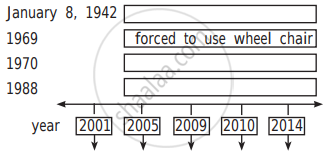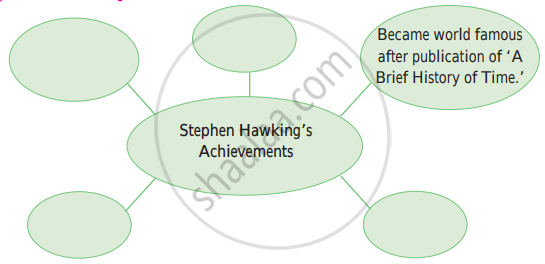Advertisements
Advertisements
प्रश्न
Shape your mind. Complete the network of cluster diagrams with the name of great personalities and their contribution.

उत्तर
1. Field of excellence: Fine Art
Satyajit Ray (film director) rose to fame with 'Pather Panchali
• combined humanism and simplicity in his film making
• won Honorary Oscar Award in 1992
Vasudeo Gaitonde (painter)
•started Bombay Progressive Arts Group
•combined Zen philosophy and calligraphy to create abstract paintings
•awarded Padma Shri posthumously in 1971
Rabindranath Tagore (poet)
•wrote 'Gitanjali
•combined nationalism, and spiritualism to express his ideas
•won Nobel Prize for English Literature in 1913
2. Field of excellence: Mathematics
Srinivasa Ramanujan Field: Mathematics
•famous for the Ramanujan prime, the Ramanujan theta function
•One of the Fellows of the Royal Society
•the first Indian to be elected a Fellow of Trinity College, Cambridge
Euclid Field: Geometry
•Father of Geometry
•his book Elements' served as the main textbook to teach Mathematics until the early 20th century
Shakuntala Devi Field: Numbers
•known as the human-computer
• 6 years old: demonstrated her arithmetic abilities at the University of Mysore
• she could give the 23rd root of a 201-digit number in 50 seconds
• in 2013, honoured with a Google Doodle for what would have been her 84th birthday
3. Field of excellence: Literature
Shakespeare (poet, dramatist)
• wrote many plays like Macbeth. Hamlet, and also many sonnets.
•combined humanism and felicity of verbal expression in his writings, known especially for his characterizations
•considered by many as the greatest writer in English
Charles Dickens (novelist)
• wrote many novels depicting conditions in the Victorian era
• combined verbal descriptions with strong characterizations
• considered by many as the greatest novelist of the Victorian era.
G. B. Shaw (playwright)
• wrote many plays such as 'Pygmalion', 'Man and Superman
• combined social satire with the wit to criticize many social mores and traditions
•leading literary figure of the 19th and 20th centuries
4. Field of excellence: Science Marie Curie
Field: Physics, Chemistry
•pioneering work on Radioactivity: discovery of polonium and radium •first woman to win the Nobel Prize
•first person and only woman to win the Nobel prize twice
•the first woman to become a Professor at the University of Paris
Alexander Graham Bell
Field: Physics, Sound
•awarded the first US patent for the telephone in 1876
•groundbreaking work in optical telecommunications and aeronautical
•received numerous honorary degrees and dozens of medals and awards
CV Raman
Field: Physics
• groundbreaking work in the field of light scattering
•won the Nobel Prize for Physics in 1930
•famous for the Raman effect
•1954 awarded the Bharat Ratna
•also awarded the Lenin Peace Prize and made a Fellow of the Royal Society.
APPEARS IN
संबंधित प्रश्न
Get into pairs and match the prominent personalities with the disabilities they had :
| ‘A' | ‘B’ |
| (1) John Milton | The great German composer and musician who became deaf at the age of 28 years |
| (2) Beethoven | The great English poet who became blind at the age of 43 years. |
| (3) Stephen Hawking | An American enterpreneur, animator, voice actor, had a learning disability. |
| (4) Walt Disney | Famous scientist of the 20th century who was paralyzed. |
| (5) Albert Einstein | A great inventor who has over 1000 patents had a learning disability and became deaf. |
| (6) Thomas Edison | Great 20th Century scientist and noted physicist who had a learning disability. |
| (7) Hellen Keller | Dancer whose leg had to be amputated because of an accident. |
| (8) Sudha Chandran | Was blind and deaf. |
| (9) Tanay Grey-Thompson | Had polio and was elected as the President of the United States for four terms. |
| (10) Franklin Roosevelt | Is a wheelchair racer. |
Observe the timeline and search the occurrences according to it. Prepare a chart.

Make a list of books written by Stephen Hawking.
| Name of the book | What’s in it? (topics covered) | His contribution to the world |
| 1. _______________ | (a)_______________ | |
| 2. _______________ | (b) _______________ | |
| 3. _______________ | (c) _______________ | |
| 4. _______________ | (d) _______________ |
Make a list of Hawking’s physical inabilities after 1963.
(a) __________________ (d) __________________
(b) _________________ (e) __________________
(c) __________________ (f) __________________
Complete the following web.

Do you agree or disagree with the following statement? Justify your stand/ answer by quoting a line from the text.
Stephen Hawking was diagnosed with Alzheimer’s disease
Do you agree or disagree with the following statement? Justify your stand/ answer by quoting a line from the text.
Hawking believed that man cannot live on other planets in the future.
The following incident in Stephen Hawking’s life is given in jumbled order. Arrange the incidents in proper sequence as per their order of occurrence in Hawking’s life.
Hawking’s book ‘The Universe in a Nutshell’ offered an illustrated guide to cosmology’s big theories.
The following incident in Stephen Hawking’s life is given in jumbled order. Arrange the incidents in proper sequence as per their order of occurrence in Hawking’s life.
Hawking published the book ‘A Brief History of Time’ that offered an overview of space and time.
The following incident in Stephen Hawking’s life is given in jumbled order. Arrange the incidents in proper sequence as per their order of occurrence in Hawking’s life.
Hawking was unable to attend a conference in Arizona.
